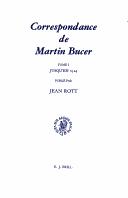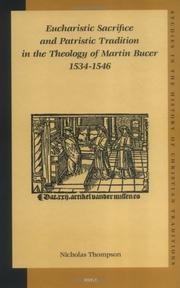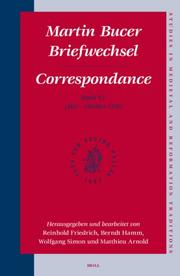| Listing 1 - 6 of 6 |
Sort by
|
Book
ISBN: 1282602497 9786612602498 9047424638 Year: 2008 Volume: v. 25, 43, 56, 78, 101 Publisher: Leiden ; Boston : E.J. Brill,
Abstract | Keywords | Export | Availability | Bookmark
 Loading...
Loading...Choose an application
- Reference Manager
- EndNote
- RefWorks (Direct export to RefWorks)
Unlike most theologians of his age, Martin Bucer proved to be farsighted with respect to European affairs: In addition to his contacts within Alsace and Germany he established relations with almost every European country. It was his ecumenical attitude that always led him to mediate between the parties in the religious battles of his time. His deep commitment to the goal of reaching agreement can be traced in all his activities, works and letters. Since the first editor, Jean Rott (Strasbourg), died in 1998, Bucer's correspondence has been edited in Erlangen. This academic edition of source material provides future research with a broad basis for significant aspects of Reformation history about which very little is known. Volume VII covers the period from October 1531 to March 1532.
Reformation --- Correspondence. --- Bucer, Martin, --- Reformation. --- Theology, Doctrinal --- History

ISBN: 9789004306790 900430679X 9004058052 9004086366 9004103694 9789004116207 9789004138612 9789004154940 9789004171329 9789004203648 9789004265264 9004116206 9004138617 9004154949 9789004103696 9789004265271 9004309888 9004474498 9789004309883 9789004474673 9789004475816 9004474676 9004171320 9789004058057 9004203648 9004265260 900430987X 9789004309876 Year: 1995 Volume: 56 3 Publisher: Leiden; Boston : BRILL
Abstract | Keywords | Export | Availability | Bookmark
 Loading...
Loading...Choose an application
- Reference Manager
- EndNote
- RefWorks (Direct export to RefWorks)
The third volume of Bucer's Correspondance covers the years from 1527 to 1529. In this period the reformer played an increasing part in Strasbourg, while his renown started growing abroad. In Strasbourg he was put in charge of the St. Thomas parish, located closer to the city center. Along with his colleagues he appealed relentlessly to the City Council for a stricter moral discipline, for struggle against anabaptism and celebration of the mass, which was suspended on February 20, 1529. Moreover he engaged in great activity in publishing five important biblical commentaries. Outside Strasbourg he intensified his evangelical propaganda in countries speaking romanic languages. His active involvement in the Berne disputation in January 1528 helped him make contact with the European Reformation. In the disastrous sacramentary strife he continued taking part in advocating concord between the protestant theologians. That is why he joined Philip von Hessen in setting up the Marburg colloquium. Faced with whose partial failure, he did his best to encourage Zwingli's project of a defensive alliance among evangelical cities in Switzerland and in the South-West of Germany, called the "Burgrecht".
2 BUCER, MARTIN --- 2 BUCER, MARTIN Godsdienst. Theologie--BUCER, MARTIN --- Godsdienst. Theologie--BUCER, MARTIN --- Bucer, Martin --- Oeuvres --- Édition critique --- Reformation --- Réformation --- Correspondence. --- Correspondance --- Bucer, Martin, --- Correspondence --- Butzer, Martin, --- Reformers --- 284.1 <093> --- -Protestant Reformation --- Church history --- Counter-Reformation --- Protestantism --- 284.1 <093> Lutheraanse hervorming. Reformatie van Luther--Historische bronnen --- Lutheraanse hervorming. Reformatie van Luther--Historische bronnen --- History --- -284.1 <093> Lutheraanse hervorming. Reformatie van Luther--Historische bronnen --- Protestant Reformation --- Bucerus, Martinus --- Reformation - Correspondence --- Bucer, Martin, - 1491-1551
Book
ISBN: 9789004273238 9789004273245 9004273247 9004273239 1306976820 Year: 2014 Volume: 184 6 Publisher: Leiden : Brill,
Abstract | Keywords | Export | Availability | Bookmark
 Loading...
Loading...Choose an application
- Reference Manager
- EndNote
- RefWorks (Direct export to RefWorks)
Martin Bucer's De vera et falsa caenae dominicae administratione marks the collapse of his hopes for a negotiated settlement of the Reformation in Germany. He completed the work in March 1546 as fresh negotiations between Catholic and Protestant theologians reached an impasse in Regensburg, as the second session of the Council of Trent was meeting, and as Charles V prepared to make war on the Protestant League of Schmalkalden. At one level the work deals with the church's authority to regulate the celebration of the Lord's Supper, but at a more fundamental level it challenges moderate Catholics such as the humanist scholar Bartholomaeus Latomus to decide whether their ultimate loyalties lie with pope and council or with Christ and his Gospel.
Neo-Latin literature --- Lord's Supper --- Church history --- History of doctrines --- Latomus, Bartholomaeus, --- 2 BUCER, MARTIN --- 265.3 --- Christianity --- Ecclesiastical history --- History, Church --- History, Ecclesiastical --- History --- Communion --- Eucharist --- Holy Communion --- Sacrament of the Altar --- Blood --- Sacraments --- Sacred meals --- Last Supper --- Mass --- Godsdienst. Theologie--BUCER, MARTIN --- Eucharistie --- Religious aspects --- 265.3 Eucharistie --- 2 BUCER, MARTIN Godsdienst. Theologie--BUCER, MARTIN --- Latomus, Barthélémy --- Latomus, Bartholomaeus --- Église --- Histoire des doctrines --- Histoire --- Bucer, Martin, --- Critique et interprétation. --- Latomus, Barthélemy --- Bucer, Martin --- Lord's Supper - Early works to 1800. --- Lord's Supper - History of doctrines - 16th century. --- Church history - 16th century - Sources. --- Latomus, Bartholomaeus, - 1485?-1570. --- Église --- Critique et interprétation.

ISBN: 9004141383 9786610915569 9047406532 1280915560 1429408472 9781429408479 9789004141384 9781280915567 6610915563 9789047406532 Year: 2005 Publisher: Leiden ; Boston : Brill,
Abstract | Keywords | Export | Availability | Bookmark
 Loading...
Loading...Choose an application
- Reference Manager
- EndNote
- RefWorks (Direct export to RefWorks)
Luther described the Mass as the "greatest and most horrible abomination" of the papal church. On this, he argued, nothing could be surrendered. However, during the 1530s and early 1540s, the Strasbourg reformer Martin Bucer (1491-1551) sought rapprochement with the Catholics on precisely this matter. This book looks at Bucer's overtures to Catholic moderates in the era of the religious colloquies. He proposed to circumvent the Reformation impasse by returning to the Eucharistic theology of the church fathers and early scholastics. These efforts culminated in the Eucharistic articles of the Worms-Regensburg Book (1541). Bucer's falling out with the same Catholics in aftermath of the Colloquy of Regensburg reveals the extent to which the agreed articles were based on misunderstanding - as well as the considerable common ground that continued to exist between them. In its examination of this most fraught of Reformation debates, the book also sheds light on Bucer's ecumenical theology and his aspirations for a reunion of the German and European churches.
Lord's Supper --- Oblation (Lord's Supper) --- Sacrifice --- Sacrifice. --- Christianity --- Bucer, Martin, --- Bucerus, Martinus --- History of doctrines

ISSN: 15734188 ISBN: 1283856328 900421058X 9789004210585 9004203648 9789004203648 9789004154940 9004154949 9789004309876 9789004058057 9789004103696 9789004306790 9789004265264 900430679X 9004103694 9789004116207 9789004171329 9004265260 9004171320 9004116206 9004058052 900430987X 9789004265271 9004086366 9789004138612 9004265279 9004138617 Year: 2011 Volume: v. 153 Publisher: Leiden ; Boston : Brill,
Abstract | Keywords | Export | Availability | Bookmark
 Loading...
Loading...Choose an application
- Reference Manager
- EndNote
- RefWorks (Direct export to RefWorks)
Nachdem Bucer sich im Winter 1531/32 in Straßburg mit den dort zahlreich versammelten Dissenters auseinandergesetzt hat, rückt ab dem Frühjahr 1532 wieder die Reichspolitik ins Zentrum seiner Aufmerksamkeit, als in Schweinfurt in Bucers Gegenwart die Verhandlungen über einen befristeten Waffenstillstand zwischen Kaiser und Protestanten beginnen. Erst Bucers theologische Gutachten und Argumentationshilfen eröffnen den Oberdeutschen dort die Möglichkeit, die Lehrformulierungen der Confessio Augustana und ihrer Apologie mitzutragen und so gegen das Kalkül des Kaisers die politische Isolation zu vermeiden. Während die lutherische Seite dies als Wechsel auf ihre Seite deutet, fühlen sich die Zwinglianer im Stich gelassen, zumal Bucer seine scharfe Kritik an deren Akzeptanz des Zweiten Kappeler Landfriedens bekräftigt. So muss Bucer sich für die Unterschrift von Schweinfurt vielfach rechtfertigen. Ausführlich und theologisch substantiell tut er dies in seinen Schreiben an Bonifatius Wolfhart, Leo Jud und Heinrich Bullinger.
Reformation --- Protestant Reformation --- Church history --- Counter-Reformation --- Protestantism --- History --- Bucer, Martin, --- Bucerus, Martinus --- 284.1 <093> --- 284.1 <093> Lutheraanse hervorming. Reformatie van Luther--Historische bronnen --- Lutheraanse hervorming. Reformatie van Luther--Historische bronnen --- Bucer, Martin, - 1491-1551 --- -Correspondence --- Bucer, Martin --- Oeuvres --- Édition critique --- Correspondence. --- Réformation --- Correspondance --- Correspondence --- Butzer, Martin,
Book
ISBN: 9783319102382 3319102370 9783319102375 3319102389 Year: 2015 Publisher: Cham : Springer International Publishing : Imprint: Springer,
Abstract | Keywords | Export | Availability | Bookmark
 Loading...
Loading...Choose an application
- Reference Manager
- EndNote
- RefWorks (Direct export to RefWorks)
This book considers Martin Bucer (1491-1551) as a teacher of theology, focusing on his time as Regius Professor of Divinity at the University of Cambridge between 1549 and 1551. The book is centered on Bucer’s Cambridge lectures on Ephesians (1550-1551), analyzing them to find out how they display his method of teaching and “doing” theology, and in particular how they shed light on the relationship between biblical exegesis and theological formulation as he understood it. Divided into two interconnected parts, the first part establishes the historical context for the lectures, including a broad sketch of scholastic method in theology and the biblical humanist critique of, and alternative to, that method. The second part closely examines Bucer’s practice in his Cambridge lectures, showing the extent to which he was a theologian of the biblical humanist school, influenced (from early in his career) by the method Erasmus set forth in the Ratio Verae Theologiae in which true theology begins, ends, and is best done as an exercise in the exegesis of the Word of God.
Humanities / Arts. --- Religious Studies. --- Religion and Education. --- History. --- Humanities. --- Religion and education. --- Religion (General). --- Sciences humaines --- Histoire --- 2 BUCER, MARTIN --- 227.1*4 --- Godsdienst. Theologie--BUCER, MARTIN --- Brief van Paulus aan de Efesiërs --- Religion --- Philosophy & Religion --- Religion - General --- 227.1*4 Brief van Paulus aan de Efesiërs --- 2 BUCER, MARTIN Godsdienst. Theologie--BUCER, MARTIN --- Humanism. --- Bible. --- Ebesosŏ (Book of the New Testament) --- Epheserbrief (Book of the New Testament) --- Ephesians (Book of the New Testament) --- Religion. --- Church and education. --- Religious Studies, general. --- History, general. --- Philosophy --- Classical education --- Classical philology --- Philosophical anthropology --- Renaissance --- Religion, Primitive --- Atheism --- God --- Irreligion --- Religions --- Theology --- Annals --- Auxiliary sciences of history --- Education and church --- Education
| Listing 1 - 6 of 6 |
Sort by
|

 Search
Search Feedback
Feedback About UniCat
About UniCat  Help
Help News
News